Death is part of the Cycle of Life that we all must undergo at some point. In Chinese culture, there are a lot of superstitions about death. Traditional Chinese funerals are characterized by numerous rites and rituals and funeral etiquette that must be strictly adhered to.
Failure to follow the correct Chinese funeral customs is believed to bring bad luck to the family. So, if you find that you are about to be a part of a traditional Chinese Funeral and are confused about the dos and don’ts, this post will come in handy. We will be covering everything there is to know about the customs followed in a Chinese funeral, from what to wear, to where and how the dead are buried.
What To Wear To A Chinese Funeral?
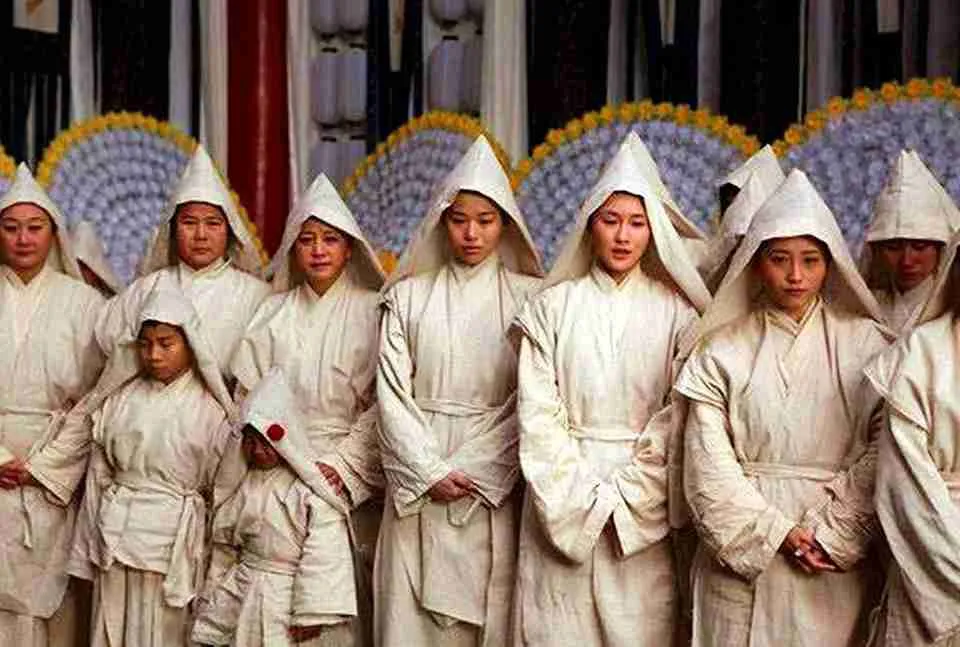
Among the most important things when it comes to etiquette, is your dressing, not just in Chinese funerals but all events in general. You must always dress according to the occasion. You don’t want to be the sore point at an event attracting the wrong attention to yourself.
Funerals are, however, more sensitive to how one dresses. The occasion is a somber one, so your dressing should match the mood. Traditionally, the family of the deceased, along with the guests would wear plain white clothes to the funeral. Due to the Western influence, however, the Chinese have adopted wearing black to the funeral. As a guest, you could wear pale or muted shades, although your safest bet would be black or darker colors.
Avoid wearing any bright or vibrant colors, as well as clothing with any designs or patterns. Such attires would contradict the atmosphere and emotions of the occasions. Red, should especially be a color you avoid when attending Chinese funerals, as it is associated with happiness in their culture. There is, however, an exception where you can wear red or pink to the funeral. That is if the deceased is 80 years or above. In such a case, the funeral is more of a celebration of life rather than mourning a loss. That’s because at that age the deceased has probably lived life to the fullest and achieved their dreams.
What Color Flowers For Chinese Funeral?
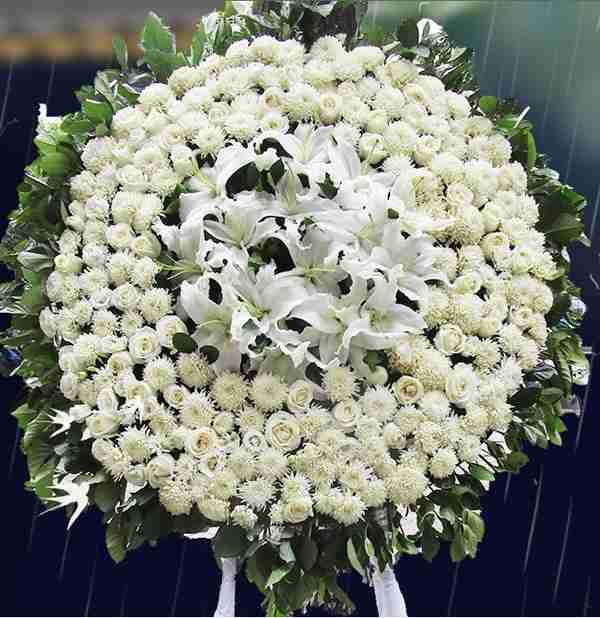
Flowers are also an important part of a funeral. It is therefore not uncommon to find many wreaths of flowers included in a funeral. But is vital that you understand which flowers are suitable as per Chinese culture, and in what colors.
Traditionally, white iris flowers are considered the customary funeral flowers according to Chinese culture. It is therefore common for relatives to bring wreaths of white irises. If the deceased was employed, it is also customary the employer brings or sends a wreath wrapped in white irises and money. This is seen as a show of gratitude for the deceased’s hard work and dedication.
As a guest, you could also bring wreaths of white irises, although it is also acceptable to bring white chrysanthemums which symbolize grief, or even yellow mums. Once again, there is an exception to the customary white flowers, if the deceased is 80 years and over. Since the funeral is a celebration, it is acceptable to bring red flowers or wreaths. Women in the deceased’s family are also allowed to wear mourning flowers in their hair, with varying colors depending on what their relationship was. For example, the wife, daughters, and daughters-in-law would wear white flowers, while the grandchildren would wear green flowers. The great-grandchildren on the other hand would wear blue flowers while the great-great-grandchildren would wear red flowers.
What Happens At A Chinese Funeral?
As we’ve mentioned there are a lot of rites and rituals performed both before, during, and after the funeral. For that reason, there is a lot of preparation that goes into the occasion. There are two main forms of traditional Chinese funerals.
chinese funeral superstitions
49 days after death chinese tradition: The first form involves a ceremony that should traditionally last for 49 days although the first seven days are the most important. Throughout the 49 days, there are prayer ceremonies held after every 7 days. This, however, depends on the financial situation the family is in. If they cannot afford to have all the ceremonies then the procedure is shortened by three to seven days. During these ceremonies, the daughters of the family are the ones responsible for overseeing the expenses of the ceremonies. The head of the family is also expected to attend at least the first two prayer ceremonies and later during the burial. The second form involves prayer ceremonies offered after every 10 days. The most important ceremonies are the initial ceremony and the three consecutive periods thereafter. 100 days after death chinese: The final prayer ceremony is then conducted after 100 days, but this is optional. The prayer ceremonies were important because it was believed that the prayers helped ensure that the deceased was well equipped for the afterlife or had a favorable rebirth. Chinese mourning period 3 years: The traditional mourning period, called 守喪 (shǒusāng) is one year, and for the first-born son up to three years.
After the prayer ceremonies, the coffin is sealed and a white and yellow holy paper is placed on top of the coffin. As this is being done those in attendance are asked to look away since it was considered bad luck to watch. Once shield, the coffin will be carried outside to a road close to the house. Here more prayers are offered and paper scattered everywhere. The coffin will then be placed in a slow-moving hearse with a procession of the families closed behind.
Note, however, that in Chinese culture, that an elder should not be the one to show respect to a younger person. For example, if a man died without any wife or children, then the parents are not allowed to carry his remains home and perform the last rights, this is left to the children or offspring of the deceased. Similarly, when a child dies, they are buried in silence. On the other hand, if the deceased is elder then all of the rites must be performed completely, regardless of whether the family can afford it or not. The rites will vary slightly depending on the region and the deceased’s age and status.
What Do You Do At A Chinese Funeral?
Your role at a Chinese funeral is largely dependent on your family to the deceased. The family plays a key role in the preparation and execution of the ceremony. As a family member, you are expected to take a turn sitting next to the coffin during the wake. This is seen as an act of loyalty to the deceased where you are keeping him/her company as they prepare to journey into the afterlife. The family also hires professional mourners to wail at the funeral, as this is seen as a sign of respect for the deceased.
The family will also burn spirit paper and miniature versions of items associated with the deceased’s interest so that they can have these items in the afterlife. The eulogy may also be read at the funeral and a prayer is said if the person was religious. The family will also distribute red envelopes with a coin, handkerchief, and a sweet, to ensure the guests get home safely. These items are not to be taken home as that would be a bad omen. There is a red thread that guests may receive which can be taken home and tied to the doorknobs to keep evil spirits.
As a guest, your main role is to come and show your respect to the deceased and the family. While doing this you should be careful not to offend the family. You should also adhere to the customs. You can bring the family flowers or wreaths of white mourning flowers. You could also prepare cash gifts for the family as a way of showing your respect and support.
What Can You Not Do At A Chinese Funeral?
Chinese culture is very strict about adhering to funeral customs and ensuring that they are done properly. As such, there are several don’ts when it comes to a traditional Chinese funeral:
Don’t be loud.
As you know, such a ceremony has a somber tone. So, while you can speak to the deceased’s family, you shouldn’t speak or laugh too loudly. This could be seen as a sign of disrespect. Even while mourning and wailing, it should be done calmly, as death should be viewed as with calm acceptance and not devastated mourning.
Don’t pay respects to your juniors.
As we’ve mentioned that the young should be the ones to show their respects to the deceased and not those elder to the deceased. That means that even for parents who lose their child, you must conduct a silent ceremony. Otherwise, that will be taken as you showing your respects.
Do not wear red, bright, or patterned clothes.
Red, as we’ve mentioned, is a color associated with happy occasions and celebrations, therefore not appropriate for a funeral in Chinese culture. You shouldn’t also wear patterned clothes; they should be completely plain. This is of course unless the funeral is for someone who was 80 years and above in which case the funeral is considered a celebration of a life well-lived.
How Much Money Do You Give At A Chinese Funeral?
According to Chinese funeral customs, guests usually gift money in white envelopes to the deceased’s family. You can either give it directly to a family member or put it in a donation box if it’s been put out. This can be done a day before or on the day of the funeral.
The amount of money put in the envelope will vary depending on several factors. It depends on how close the guest is to the grieving family. It is also determined by the financial status of the family as well as the financial capacity of the guest. But even with that said, the minimum amount expected in the envelope is 101 yuan, that’s roughly $16. There is no upper limit, but ensure an amount is an odd number. When enclosing and gifting the money, you could also choose to write your name on the envelope or remain anonymous.
Chinese Funeral Paper Money.
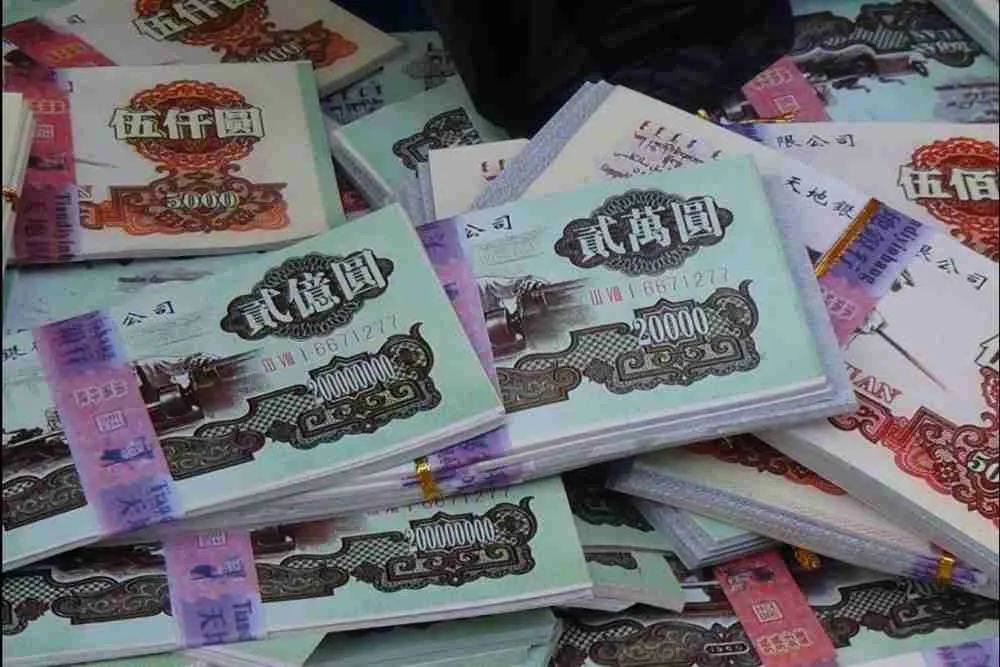
The Chinese believe that death is just a transition and not the end. They believe that there is an afterlife and so they try to ensure that the deceased will be comfortable in their new life. In the past, the dead would be buried with their belongings like clothes and gold. Today that tradition has evolved to the burning of funeral money.
This paper money is commonly called Joss money/paper. Sometimes it is referred to as ghost or spirit money. It is made from bamboo or rice paper and designed to mimic real money. The deceased family will burn this money throughout the wake and funeral to ensure that the deceased has plenty of it in the afterlife. They also burn miniature paper houses, cars, or anything that was of interest to the deceased. That way the deceased would have a comfortable life in the spirit world.
Chinese Funeral Candles And Incense.
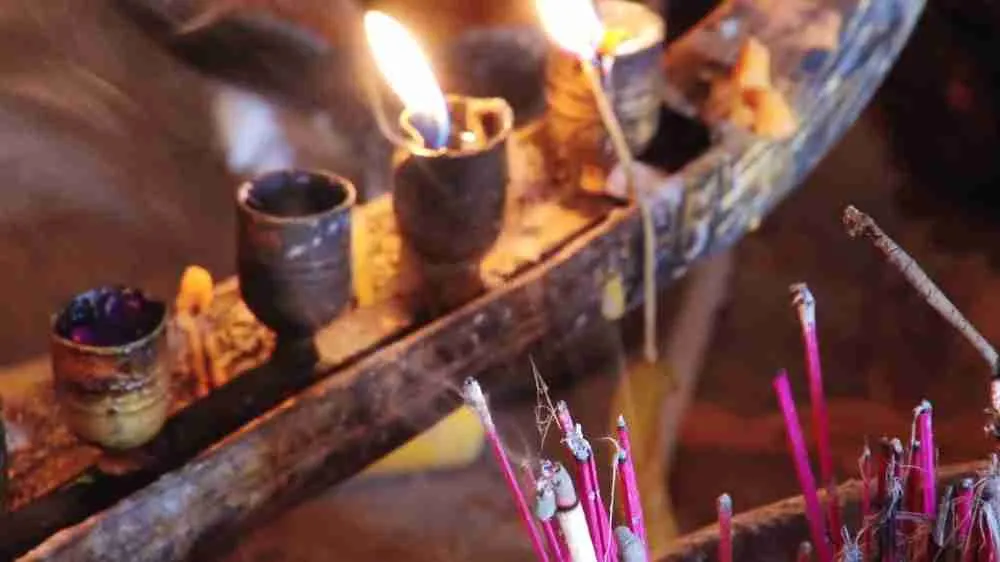
Joss paper is however not the only thing burned during a Chinese funeral. Incense is also burnt and candlesticks lit. This is also done to aid the decease in passing to the next world. The candles and incense would be burnt at the gravesite, placed at the front of the grave mount, in sets of three. This was done both on the day of the funeral and again when the family revisited the grave a few days later.
How Do Chinese Bury Their Dead?
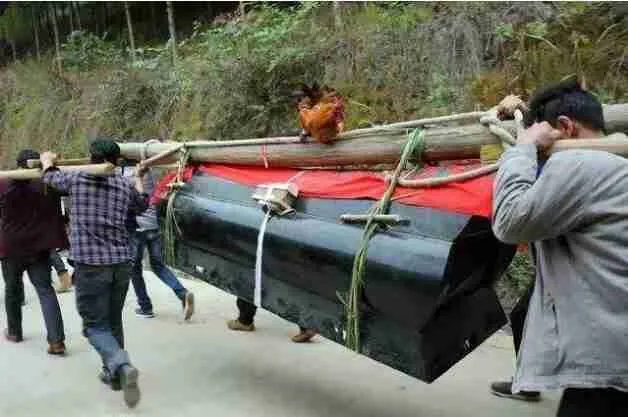
After the funeral ceremony, the casket is put in a hearse and is accompanied by a funeral procession to the burial site. A large portrait of the deceased is usually placed on the windshield of the hearse. The procession is led by a band playing loud music to scare off any evil spirits. How big and lavish the procession is will depend on the financial status of the deceased and family.
The family of the deceased will also be at the front row of the procession, with the deceased children and in-laws wearing black and white and the grandchildren wearing blue mourning clothes. At times the family might hire mourners to fill the procession. Guests and other mourners can wear any shade of color as long as it is somber. They also wear a cloth band on their arms either on the left or right depending on whether the deceased is a man or woman respectively.
Once at the burial site, the casket is taken down and lowered into the ground. It is considered a bad omen for people to witness this, so everyone present is asked to look away. The family members and relatives of the deceased will then take turns throwing a hand full of dirt into the grave. After that, the grave is filled and the grave keeper may offer some prayers to the deceased.
Before those in attendance left, the family presents each one with a red envelope containing a coin, candy, and sometimes a handkerchief. These items are to be used before the guests arrive at their respective homes since it is bad luck for them to carry them home. They are also meant to burn their mourning clothes after the funeral.
Where Do Chinese Bury Their Dead?
Normally, the Chinese bury the dead on the hillside. As per their superstitions doing so helps with Fengshui. It is worth noting that the higher the status of the deceased and family, the higher up the burial site will be. The higher the burial site the better.
Although traditionally, the Chinese would bury their dead, today cremation has gained more popularity than before. Aside from the two methods, other methods that have been adopted by the Chinese when it comes to disposing of the body are, water, sky, tree, cave, or cliff burials.
Why Do Chinese Bow 3 Times At Funeral?
According to Chinese culture, the act of bowing is a sign of deep respect and humility. Therefore, bowing three times is a way of showing deep respect to the one being bowed to. With that said, the Chinese bow three times at a funeral as a way of paying their respects to the deceased. Note however this is not done by elders, gather the children and grandchildren of the deceased. As we’ve explained before, this is because, in Chinese culture, the elders are not meant to show respect to the younger ones. It should be the other way around.
Chinese Funeral Taboos.
Along with the dos and don’ts at Chinese funerals, there are various Taboos. The following are some of the things considered funeral taboos in Chinese culture.
Throwing away candy – this is the sweet given to every guest at the funeral. This sweet should be eaten before the guest leaves as it is meant to get them home safely and is also a symbol of new beginnings. Throwing away the sweet is a bad omen.
Looking at a coffin being closed – by looking at a coffin while it’s being closed you are preventing the deceased from departing peacefully.
Saying thank you – this may be good manners but in Chinese culture, it is believed that there is nothing to be thankful about at a funeral. As such families will appreciate guests by saying ‘you’re very considerate.
Letting cats into the wake – Chinese believe that if a cat is to jump over the coffin, then the dead body will jump out. So, juniors in the family are tasked to ensure no cats are within the vicinity.
Saying ‘goodbye’ in Chinese – although this is a farewell moment, it is believed that if you say Zai Jian to the deceased, they will come back and look for you. That’s because that term can also mean ‘see you again.
Conclusion:
Chinese funeral customs vary based on several factors. The rites performed are dependent on the region, and the deceased age, marital and social status. So, the next time you are preparing to attend a Chinese funeral ensure you learn the proper etiquette based on these determining factors. That way you can avoid offending anyone and can properly pay your respects.
Precious article! Thank you! And, may I ask you what do Chinese people actually say/pray (if they pray or say anything) when bowing 3 times during celebrations and positioning of incense in front of statues or such?
yes